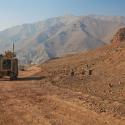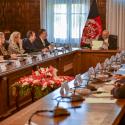Jeffrey Dressler On Possible French Withdrawal From Afghanistan
Jan 23, 2012 - AnonymousISW Senior Research Analyst Jeffrey Dressler discusses the possibility of French withdrawal from Afghanistan following the deadly shooting.
ISW Senior Research Analyst Jeffrey Dressler discusses the possibility of French withdrawal from Afghanistan following the deadly shooting.

Iraq and Syria. The Iraqi Kurdish Peshmerga and Iraqi Security Forces (ISF) will likely remain unable to address coordination issues on the line of control between Iraqi Kurdistan and federal Iraq, likely enabling ISIS to continue its low-grade insurgency in Iraq’s disputed internal boundaries (DIB). ISIS uses the unsecured areas between Iraqi Kurdistan and federal Iraq to enable attacks against urban areas, such as Kirkuk city, and to resupply its attack cells across eastern Iraq. The coordination issues between the ISF and Kurdish Peshmerga will likely continue indefinitely without a political solution to the DIB issue, as stipulated under the 2005 Iraqi constitution.
Burkina Faso. The Burkinabe junta has significantly increased drone strikes targeting al Qaeda and Islamic State–affiliated militants since late March 2023 to compensate for manpower capacity limitations and boost its popular support. The drone strikes may temporarily degrade the insurgents’ support zones and their ability to organize large-scale attacks on Burkinabe forces. However, both groups will likely adapt to continue attacks, and the junta’s use of drone strikes will not address the inherent manpower shortage that constrains Burkina Faso’s counterinsurgency operations.
Mali. Al Qaeda–linked militants have continued attacking Malian security forces in the region surrounding Mali’s capital since it launched an offensive in the area in January 2023. The campaign demonstrates the militants’ ability to sustain attacks in southern Mali and increases the likelihood that they have established support zones near the Malian capital. The group likely seeks to primarily discredit and undermine the junta’s legitimacy with this campaign and will likely focus on military targets over civilian targets to achieve this goal.
Afghanistan. The Taliban have conducted more raids targeting Islamic State Khorasan Province (ISKP) in Mazar-e Sharif, northern Afghanistan’s largest city, over the past three weeks than in the rest of 2023 combined. ISKP is expanding to areas in northern Afghanistan where CTP has not previously observed ISKP activity. The Taliban supreme leader is planning to purge suspected ISKP sympathizers in the Taliban’s ranks, which may reduce ISKP’s ability to attack high-value Taliban targets. This purge risks further marginalizing non-Pashtun Taliban leaders and increasing support for anti-Taliban groups, including ISKP.

Conditions in Afghanistan are worse today than they were when the Soviets withdrew, even if the insurgency is weaker. No actors share a compelling vision for the future of Afghanistan. No faction is strong enough to exert full control over the country. As the U.S. and NATO prepare for a drawdown, they must be clear-eyed about the likely outcome.

The Trump Administration is attempting to deny jihadists a safe haven in Afghanistan while pursuing a negotiated end to the war there. There is also a brewing political storm surrounding the U.S. partner government in Kabul. Is the U.S. plan for Afghanistan at risk?

The U.S. and Afghanistan have an opportunity to advance their strategic goal of negotiating an acceptable settlement with the Taliban. Large numbers of rank-and-file militants expressed their support for peace during unprecedented joint celebrations amidst a nationwide ceasefire for Eid al-Fitr on June 15 - 17.
Vice President Nouri al-Maliki–seeking to regain the premiership–is likely leveraging his influence over the judicial process to marginalize political rivals ahead of the legislative and provincial elections, slated for May 12, 2018. Maliki previously influenced Iraq’s judiciary and ostensibly independent bodies to eliminate rival candidates and politicians during his two terms as Prime Minister (2006-2014).
Afghanistan remains a safe haven for terrorist plots against the U.S. homeland. The Islamic State of Iraq and al Sham’s (ISIS) affiliate in Afghanistan and an American ISIS member in Pakistan coordinated an attack attempt in the U.S. in early 2016. ISIS seized at least one district in northwestern Afghanistan in early November, and is assembling new foreign fighter units. ISIS will use this safe haven to conduct new attacks abroad.
In his December 2009 speech at West Point, President Obama set July 2011 as the beginning of a process of transition in Afghanistan, where geographic or functional responsibilities are to be handed over from the international coalition to the host nation. As policymakers in NATO capitals and practitioners in Afghanistan think about transition, they can take a lesson from the Iraq experience. The United States actually experienced two types of transitions in Iraq.
"In May, 2007 I deployed to Iraq to become the Commanding General responsible for accelerating the growth of the Iraqi